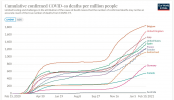Vaughn Palmer: B.C. readies plans to stop visitors at the Alberta border, if needed
If variants cannot be contained, B.C. may need to restrict visitors from Alberta and points East.
Vaughn Palmer
Feb 12, 2021
VICTORIA — B.C. is working on “plans and protocols” to restrict non-essential travel from the rest of Canada, Premier John Horgan confirmed this week.
Horgan was responding to Prime Minister Justin Trudeau’s statement leaving border control between provinces up to the provinces themselves.
Was B.C. contemplating “any specific border restrictions?” Horgan was asked during his weekly news conference on Wednesday.
“Not at this time,” he replied, but added: “We have staff working on various plans and protocols that we could put in place — we don’t want to get caught short.”
He said the province was consulting the same officials “that we used to shore up the federal government … by putting provincial government workers at various border points across the U.S. border.”
The province dispatched its own staff in the spring out of concern that Ottawa was foot-dragging on screening and quarantining returning Canadians and others at airports and international borders.
This time the exercise would be crafted to deal with Canadians travelling to B.C. from other provinces. “We’re looking at those plans, but we have no plan, at this point, to implement them,” Horgan emphasized.
“We are preparing to tell people to stay where they are. We will welcome you when the pandemic has subsided, but you are not welcome today.”
Manitoba has already ordered a 14-day quarantine for anyone coming into the province. The Quebec government signalled this week that it may establish checkpoints at the Ontario and New Brunswick borders to discourage non-essential travel during the March breaks.
“We are very, very worried,” said Quebec Public Security Minister Genevieve Guilbault. “We know that traditionally people go from one region to another during spring break. They rent cottages and auberges and things like that.”
Quebec’s spring break starts the first week of March. B.C.’s runs March 15 to 26.
The B.C. government has in hand a legal opinion, presented to the cabinet last month, on what the province can and cannot do to restrict cross-border travel by other Canadians.
The premier declined to release the opinion to the public. But in a statement last month, he summarized the findings.
“The review of our legal options made it clear we can’t prevent people from travelling to British Columbia,” said Horgan. “Much of current interprovincial travel is work related and therefore cannot be restricted.”
But the province does have legal authority to “impose restrictions on people travelling for non-essential purposes if they are causing harm to the health and safety of British Columbians.”
When Horgan was asked last month about the Manitoba restriction, he cited the logistical challenges of going that route in a province with many entry points — 10 interprovincial airports and more than two dozen land crossings.
Manitoba also has a greater case count than B.C. on a per capita basis. “I can well understand why they would want to do that,” said Horgan, referring to the decision to quarantine visitors from the rest of Canada.
But mainly Horgan’s hesitation came down to the advice he was getting from the provincial health officer, Dr. Bonnie Henry.
“What Dr. Henry says regularly is that we are doing our best to suppress community transmission, using contact tracing to find where exposures have taken place, and taking steps to isolate those individuals.”
Part of contact tracing is determining risks, including whether a significant number of cases are entering B.C. from other parts of Canada.
“If there is overwhelming evidence, Dr. Henry looks at this with her team,” Horgan explained. “I go back to the hours and hours that are spent analyzing data and making determinations on what steps we can take, what advice public health will give to government.”
Hence Horgan’s current stand against going the same route as Manitoba on quarantining visitors:
“Until such time as the public health officer advises me that there’s a benefit to going down that road, we’re going to leave it untravelled for the time being.
“The public health evidence is not there at this time. Dr. Henry assures me that when that evidence is there, she’ll present it to me.”
The premier said much the same this week when responding to complaints about cross border fraternizing between Canadians and Americans in Peace Arch park.
“Dr. Henry has not raised it with me, that it’s a concern and if at the end of this press conference I’ve got a voicemail from her that tells me otherwise I’m happy to get back to you,” Horgan told reporters. “If it is a bigger problem than I am expecting, I’m sure Dr. Henry will advise and we’ll take action.”
In recent weeks, Henry has flagged a growing concern about COVID-19 variants, saying if enough cases enter B.C., they could fuel a whole new pandemic.
As of Thursday, Alberta was reporting 156 cases of variants, a 50 per cent increase from the beginning of the week.
All but seven are the B.1.1.7 variant, first found in the United Kingdom and found to be about 50 per cent more transmissible than the version of the virus circulating here and elsewhere for the past year.
B.C. reported 25 cases of that variant at the beginning of the week and 15 of the B.1.351 variant, initially associated with South Africa. The province has not published an update since.
But if the variants cannot be contained, the B.C. government may need to activate its “plans and protocols” to restrict visitors from Alberta and points East.
https://vancouversun.com/opinion/co...stop-visitors-at-the-alberta-border-if-needed










